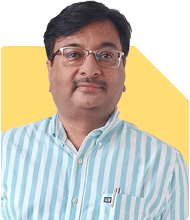Ramalingam Kalirajan |7002 Answers |Ask -Follow
Mutual Funds, Financial Planning Expert - Answered on May 23, 2024
He has an MBA in finance from the University of Madras and is a certified financial planner.
He is the director and chief financial planner at Holistic Investment, a Chennai-based firm that offers financial planning and wealth management advice.... more

Hi. I am 61 years retd . Wife taken vrs with pension . We have own house ,flat ,invested 1.8 cr in fd and 80 lacs in mf . It is spread across diverse funds ,mid cap ,large mid cap ,small cap , balanced growth ,hdfc,icici,sbi,quant ,kotak and Tata . Our children boy and girl are planning higher education in U K with loan . Any advise to improvise Prakash
Firstly, congratulations on your well-structured financial setup. It's impressive to see your diversified investments and your clear planning for the future. Having Rs. 1.8 crores in fixed deposits and Rs. 80 lakhs in mutual funds shows your commitment to securing a stable financial future. Your wife’s pension provides a steady income, and your own home adds to your financial security.
Your children’s plans for higher education in the UK indicate a significant upcoming expense, even if they are taking loans. Let’s explore ways to optimize your investments to ensure financial stability while supporting your children’s education.
Diversifying Your Investment Portfolio
Balanced Investment Approach
Your investment in diverse mutual funds is a commendable strategy. By spreading investments across mid-cap, large mid-cap, small-cap, and balanced growth funds, you are mitigating risks while aiming for growth. However, it’s essential to periodically review and rebalance your portfolio to maintain the desired asset allocation.
Actively Managed Funds Over Index Funds
Actively managed funds, which you already have, are beneficial as they can potentially outperform the market. Index funds merely replicate the market and may not offer significant returns during market downturns. Your choice of funds from reputable houses like HDFC, ICICI, SBI, Quant, Kotak, and Tata is a sound decision.
Ensuring Steady Income Post-Retirement
Systematic Withdrawal Plans (SWP)
Consider using SWPs from your mutual funds to generate a regular income. This method allows you to withdraw a fixed amount monthly while the remaining investment continues to grow. It provides a steady income stream and helps manage your monthly expenses effectively.
Fixed Deposits for Stability
Your substantial investment in fixed deposits provides a safety net. FDs offer guaranteed returns and can be used for any immediate financial needs. However, ensure that you are getting the best interest rates and consider laddering your FDs to manage liquidity and interest rate risk effectively.
Supporting Your Children’s Education
Education Loan and Financial Planning
It’s great that your children are planning to take loans for their education in the UK. However, you can also set aside some funds to support them in case of emergencies or unforeseen expenses. This can be from your existing investments or by allocating a portion of your fixed deposits.
Dedicated Education Fund
You may consider creating a dedicated education fund for your children. Investing in balanced or equity mutual funds for a period can yield significant returns, which can be used to repay the education loans or cover any additional expenses.
Managing Risks and Ensuring Financial Security
Emergency Fund
Maintain an emergency fund equivalent to 6-12 months of your expenses. This fund should be in liquid assets like savings accounts or liquid mutual funds. It ensures that you can handle unexpected expenses without disturbing your long-term investments.
Health Insurance
Ensure that you and your wife have comprehensive health insurance coverage. Medical emergencies can be financially draining, and adequate insurance prevents erosion of your savings. Additionally, consider health insurance for your children, especially if they will be studying abroad.
Optimizing Fixed Deposits
Laddering Strategy
Implement a laddering strategy for your fixed deposits. This involves spreading your FD investments across different maturities. It ensures liquidity, optimizes returns, and protects against interest rate fluctuations.
Reassessing FD Interest Rates
Regularly reassess the interest rates on your fixed deposits. Interest rates vary across banks and over time. Shifting to higher interest rate FDs can increase your returns without additional risk.
Regular Portfolio Review
Annual Review
Conduct an annual review of your portfolio. Market conditions and personal financial goals change over time. Regular reviews with a Certified Financial Planner ensure that your investments remain aligned with your goals and risk tolerance.
Rebalancing Your Portfolio
Based on performance and changing financial needs, periodically rebalance your portfolio. This involves adjusting the proportions of your investments to maintain the desired asset allocation and risk level.
Avoiding Investment Pitfalls
Disadvantages of Index Funds
Index funds, which replicate market indices, may not outperform during market downturns. Actively managed funds, with experienced managers, can adapt strategies to generate better returns in various market conditions.
Disadvantages of Direct Funds
Direct funds might seem appealing due to lower costs but require significant time and expertise to manage effectively. Investing through a Certified Financial Planner provides professional guidance and better fund selection, outweighing the cost benefits of direct funds.
Conclusion
Your current financial position is robust and well-diversified. By maintaining a balanced approach and regularly reviewing your portfolio, you can ensure steady income and financial security. Supporting your children’s education while managing risks will give you peace of mind.
Keep focusing on maintaining a diversified portfolio, and regularly review and adjust your investments. By doing so, you can enjoy a financially secure and comfortable retirement.
Best Regards,
K. Ramalingam, MBA, CFP
Chief Financial Planner
www.holisticinvestment.in
Best Regards,
K. Ramalingam, MBA, CFP,
Chief Financial Planner,
www.holisticinvestment.in
You may like to see similar questions and answers below
Ramalingam Kalirajan |7002 Answers |Ask -Follow
Mutual Funds, Financial Planning Expert - Answered on Jun 18, 2024
Ramalingam Kalirajan |7002 Answers |Ask -Follow
Mutual Funds, Financial Planning Expert - Answered on Jul 01, 2024
Ramalingam Kalirajan |7002 Answers |Ask -Follow
Mutual Funds, Financial Planning Expert - Answered on Jul 04, 2024
Ramalingam Kalirajan |7002 Answers |Ask -Follow
Mutual Funds, Financial Planning Expert - Answered on Aug 13, 2024
Dr Nagarajan J S K |161 Answers |Ask -Follow
Health Science and Pharmaceutical Careers Expert - Answered on Nov 10, 2024
Dr Nagarajan J S K |161 Answers |Ask -Follow
Health Science and Pharmaceutical Careers Expert - Answered on Nov 10, 2024
Dr Nagarajan J S K |161 Answers |Ask -Follow
Health Science and Pharmaceutical Careers Expert - Answered on Nov 10, 2024
Dr Nagarajan J S K |161 Answers |Ask -Follow
Health Science and Pharmaceutical Careers Expert - Answered on Nov 10, 2024
Shalini Singh |137 Answers |Ask -Follow
Dating Coach - Answered on Nov 10, 2024
Prof Suvasish Mukhopadhyay |38 Answers |Ask -Follow
Career Counsellor - Answered on Nov 10, 2024
Nripen Bhatt |6 Answers |Ask -Follow
Start-Up Expert - Answered on Nov 10, 2024
Nripen Bhatt |6 Answers |Ask -Follow
Start-Up Expert - Answered on Nov 10, 2024
Nripen Bhatt |6 Answers |Ask -Follow
Start-Up Expert - Answered on Nov 10, 2024
Nripen Bhatt |6 Answers |Ask -Follow
Start-Up Expert - Answered on Nov 10, 2024
























